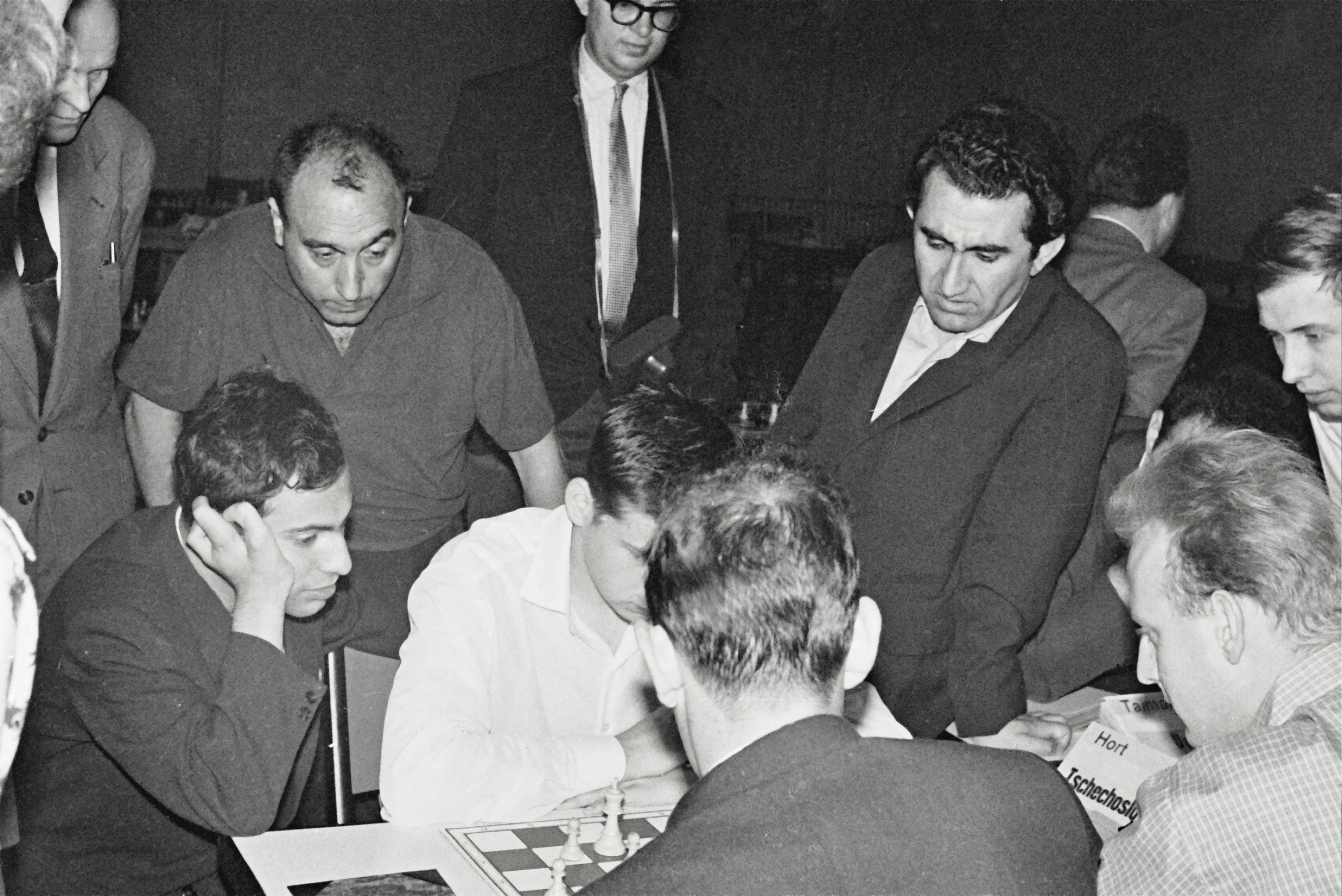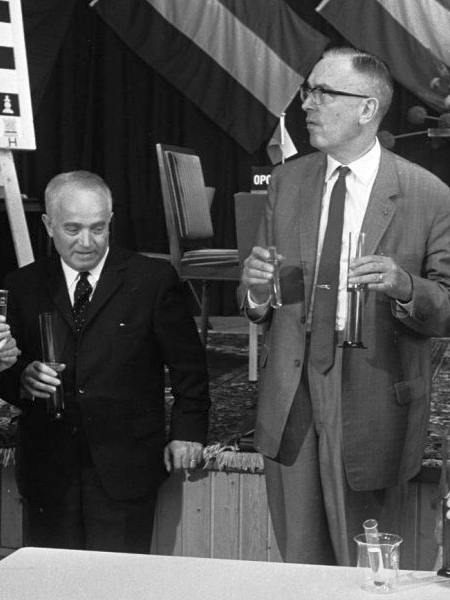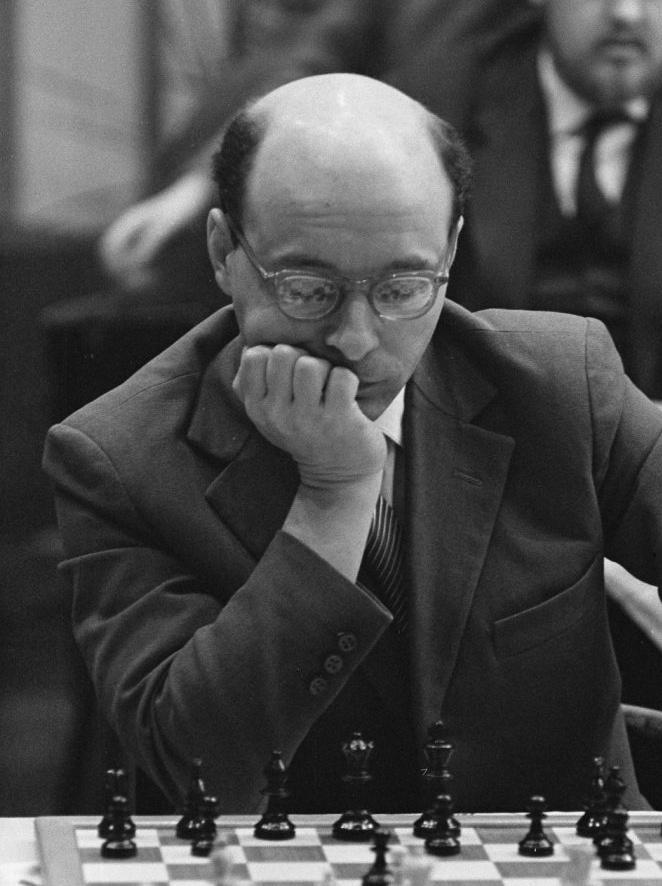|
Efim Geller
Efim Petrovich Geller (; ; 8 March 1925 – 17 November 1998) was a Soviet chess player and world-class grandmaster at his peak. He won the Soviet Championship twice (in 1955 and 1979) and was a Candidate for the World Championship on six occasions (1953, 1956, 1962, 1965, 1968, and 1971). He won four Ukrainian SSR Championship titles (in 1950, 1957, 1958, and 1959) and shared first in the 1991 World Seniors' Championship, winning the title outright in 1992. His wife Oksana was a ballet dancer while his son Alexander was also a chess master. Geller was coach to World Champions Boris Spassky and Anatoly Karpov. He was also an author. Early life Geller grew up in Odessa, Soviet Union, and was Jewish. He was a fine basketball player, and earned his doctorate in physical education before specialising in chess. His father was a First Category chess player. His development as a top player was delayed by the inception of World War II. Geller's first notable result was sixth plac ... [...More Info...] [...Related Items...] OR: [Wikipedia] [Google] [Baidu] |
Odessa
ODESSA is an American codename (from the German language, German: ''Organisation der ehemaligen SS-Angehörigen'', meaning: Organization of Former SS Members) coined in 1946 to cover Ratlines (World War II aftermath), Nazi underground escape-plans made at the end of World War II by a group of ''SS'' officers with the aim of facilitating secret escape routes, and any directly ensuing arrangements. The concept of the existence of an actual ODESSA organisation has circulated widely in fictional Spy fiction, spy novels and movies, including Frederick Forsyth's best-selling 1972 thriller ''The Odessa File''. The escape-routes have become known as "Ratlines (World War II), ratlines". Known goals of elements within the ''SS'' included allowing ''SS'' members to escape to Argentina or to the Middle East under false passports. Although an unknown number of wanted Nazis and war criminals escaped Germany and often Europe, most experts deny that an organisation called ODESSA ever existed. T ... [...More Info...] [...Related Items...] OR: [Wikipedia] [Google] [Baidu] |
Alexei Sokolsky
Alexey Pavlovich Sokolsky (3 November 1908 Penza Governorate, Russian Empire – 27 December 1969 Minsk, USSR) was a Russian chess player of International Master strength in chess, a noted correspondence chess player, and an opening theoretician. Chess career In 1935, he took second in the RSFSR Championship. He won the Ukrainian Chess Championship twice, in 1947 and 1948, and was the runner-up in the 1958 Belarusian Chess Championship. He also played in the 13th Soviet Championship in 1944, finishing with 7½/16 (tie for 8th–10th place); the 17th Championship in 1949, finishing with 8½/19 (12th place); and the 21st Championship in 1954, finishing last with 5/19. He was the first Soviet Correspondence Chess Champion (1948–1951). Legacy The name of Sokolsky is known now mostly for his opening research and development of the chess opening ''1.b4'' which became known as the Sokolsky Opening. It is also known as the Polish Opening or the Orangutan. Sokolsky Memoria ... [...More Info...] [...Related Items...] OR: [Wikipedia] [Google] [Baidu] |
Grigory Levenfish
Grigory Yakovlevich Levenfish (; – 9 February 1961) was a Soviet chess player who scored his peak competitive results in the 1920s and 1930s. He was twice Soviet champion, in 1934 (jointly with Ilya Rabinovich) and 1937. In 1937 he drew a match against future world champion Mikhail Botvinnik. In 1950 Levenfish was among the first recipients of the title of Grandmaster, awarded by FIDE that year for the first time. Early life and education Levenfish was born in Piotrków, Poland, then part of the Russian Empire, to Jacob Levenfish and Golda Levenfish (née Finkelstein). He spent most of his formative years in St. Petersburg, where he attended Saint Petersburg State Institute of Technology and studied chemical engineering. Early chess achievements His earliest recognition as a prominent chess player came when he won the St. Petersburg championship of 1909, and played in the strong Carlsbad tournament of 1911, where he scored 11½ points from 25 games. At age 22, this wa ... [...More Info...] [...Related Items...] OR: [Wikipedia] [Google] [Baidu] |
Viacheslav Ragozin
Viacheslav Vasilyevich Ragozin (; 8 October 1908 – 11 March 1962) was a Soviet chess player, writer and editor. He was world champion in correspondence chess and held the title of Grandmaster in both over-the-board and correspondence chess. Chess career Born in Saint Petersburg, Ragozin's chess career first came to the fore with a series of excellent results in the 1930s. In the earliest of these, he defeated the respected master Alexander Ilyin-Genevsky in a 1930 match and was himself awarded the title of Soviet master. At Moscow 1935, he won the best game prize for his victory against Andor Lilienthal. At the very strong Moscow tournament of 1936, he beat Salo Flohr and Emanuel Lasker and came very close to defeating José Raúl Capablanca, the ever-resourceful ex-world champion scrambling to find a draw by perpetual check at the game's frantic conclusion. There followed a victory at the Leningrad championship of 1936 and second place shared with Alexander Konstantino ... [...More Info...] [...Related Items...] OR: [Wikipedia] [Google] [Baidu] |
Tigran Petrosian
Tigran Vardani Petrosian (; ; 17 June 1929 – 13 August 1984) was a Soviet-Armenian chess grandmaster and the ninth World Chess Champion from 1963 to 1969. He was nicknamed "Iron Tigran" due to his almost-impenetrable defensive playing style, which emphasized safety above all else. Petrosian is often credited with popularizing chess in Armenia. Petrosian was a candidate for the World Chess Championship on eight occasions (World Chess Championship 1954#1953 Candidates tournament, 1953, World Chess Championship 1957#1956 Candidates tournament, 1956, World Chess Championship 1960#1959 Candidates tournament, 1959, World Chess Championship 1963#Candidates Tournament, 1962, World Chess Championship 1972#1971 Candidates matches, 1971, World Chess Championship 1975#1974 Candidates tournament, 1974, World Chess Championship 1978#1977 Candidates tournament, 1977 and World Chess Championship 1981#1980/81 Candidates Tournament, 1980). He won the World Chess Championship 1963, World C ... [...More Info...] [...Related Items...] OR: [Wikipedia] [Google] [Baidu] |
Salo Flohr
Salomon Mikhailovich Flohr (November 21, 1908 – July 18, 1983) was a Czechoslovak and Soviet chess player and writer. He was among the first recipients of the title International Grandmaster from FIDE in 1950. Flohr dominated many tournaments of the pre-World War II years, and by the late 1930s was considered a contender for the World Championship. However, his patient, positional style was overtaken by the sharper, more tactical methods of the younger Soviet echelon after World War II. Early life Flohr had a troubled childhood beset by personal crises. He was born in a Jewish family in Horodenka in what was then Galicia, Austria-Hungary (now in Ukraine). He and his brother were orphaned during World War I when their parents were killed in a massacre, and they fled to the newly formed nation of Czechoslovakia. Flohr settled in Prague, gradually acquiring a reputation as a skilled chess player by playing for stakes in the city's many cafés. During 1924, he participated ... [...More Info...] [...Related Items...] OR: [Wikipedia] [Google] [Baidu] |
Alexander Kotov
Alexander Alexandrovich Kotov (Алекса́ндр Алекса́ндрович Ко́тов; ( – 8 January 1981) was a Soviet chess International Grandmaster, grandmaster and author. He was a Soviet chess champion, a two-time world title Candidates Tournament, Candidate, and a prolific writer on the subject of chess. Kotov served in high posts in the Soviet Chess Federation, and wrote most of his books during the Cold War. The importance and breadth of Kotov's work rank him among the all-time greats in this field. Early life Kotov was born in Tula, Russia, Tula, which was part of the Russian Empire, to a large working class family. He moved to Moscow in 1939 to study engineering, and during this time studied chess a great deal. Chess career While best remembered today as an author, Kotov also had a number of good results as a player. One of his best early results was his second-place finish in the 1939 USSR Chess Championship, USSR Championship, in which he just missed out to ... [...More Info...] [...Related Items...] OR: [Wikipedia] [Google] [Baidu] |
Isaac Boleslavsky
Isaac Yefremovich Boleslavsky (, ; 9 June 1919 – 15 February 1977) was a Soviet chess grandmaster and writer. Early career Born in Zolotonosha in Ukraine to Jewish parents, Boleslavsky taught himself chess at age nine. In 1933, he became schoolboy champion of Dnipropetrovsk. Three years later, he won third prize in the 1936 USSR All-Union Junior Championship, held in Leningrad. In 1938, at nineteen, Boleslavsky won the Ukrainian Championship; the following year, he won the Ukraine SSR championship, qualified to play in the USSR Chess Championship at the age of 20, and gained his national chess master title. He earned a degree in philology at Sverdlovsk University. In 1940, Boleslavsky played in the 12th USSR championship final in Moscow. He won eight of his last ten games and tied for fifth-sixth place with Mikhail Botvinnik, but lost their personal meeting. Thereafter he sought revenge. Later, Boleslavsky as an ambitious 27-year-old master recalled the plans he had hatc ... [...More Info...] [...Related Items...] OR: [Wikipedia] [Google] [Baidu] |
Semyon Furman
Semyon Abramovich Furman (December 1, 1920 – March 17, 1978) was a Soviet chess player and trainer of Belarusian Jewish origin. He was awarded the title of Grandmaster by FIDE in 1966. Furman is best known for developing Anatoly Karpov into a World Chess Champion, but was a formidable player himself, as well as a successful coach for several other world-class players. His name is sometimes written as Semen or Semion Furman. Early life Born in Pinsk, Furman was a factory worker in Leningrad, who developed his chess skills in his spare time, and was a late bloomer by chess standards, not reaching even National Master strength until he was well into adulthood. For example, he made only an even score of 6½/13 in the All-Union Candidates-to-Masters tournament, Group 1, at Rostov-on-Don 1939. In the same event at Kalinin 1940, group 3, he was only able to score 5/11, and in the Leningrad Championship of 1940, he scored just 6½/16. His chess development was on hold during the ... [...More Info...] [...Related Items...] OR: [Wikipedia] [Google] [Baidu] |
Vasily Smyslov
Vasily Vasilyevich Smyslov (; 24 March 1921 – 27 March 2010) was a Soviet and Russian chess grandmaster who was the seventh World Chess Champion from 1957 to 1958. He was a Candidates Tournament, Candidate for the World Chess Championship on eight occasions (1948, 1950, 1953, 1956, 1959, 1965, 1983, and 1985). Smyslov twice tied for first place at the USSR Chess Championships (1949, 1955), and his total of 17 Chess Olympiad medals won is an all-time record. In five European Team Championships, Smyslov won ten gold medals. Smyslov remained active and successful in competitive chess well after the age of sixty. Despite his failing eyesight, he remained active in the occasional composition of chess problems and studies until shortly before his death in 2010. Besides chess, he was an accomplished baritone singer. Early years Smyslov was born in Moscow, into a Russians, Russian family. He first became interested in chess at the age of six. His father, Vasily Osipovich Smyslov, ... [...More Info...] [...Related Items...] OR: [Wikipedia] [Google] [Baidu] |
David Bronstein
David Ionovich Bronstein (; February 19, 1924 – December 5, 2006) was a Soviet chess player. Awarded the title of International Grandmaster by FIDE in 1950, he narrowly missed becoming World Chess Champion in World Chess Championship 1951, 1951. Bronstein was one of the world's strongest players from the mid-1940s into the mid-1970s, and was described by his peers as a creative genius and master of tactics. He was also a renowned chess writer; his book ''Zurich International Chess Tournament 1953'' is widely considered one of the greatest chess books ever written. Early life David Bronstein was born in Bila Tserkva, Ukrainian SSR, Soviet Union, to Jewish parents. Growing up in a poor family, he learned chess at the age of six from his grandfather. As a youth in Kiev, he was trained by the renowned International Master Alexander Konstantinopolsky. He finished second in the Kiev Championship when he was only 15, and achieved the Soviet Master title at the age of 16 for hi ... [...More Info...] [...Related Items...] OR: [Wikipedia] [Google] [Baidu] |
Tbilisi
Tbilisi ( ; ka, თბილისი, ), in some languages still known by its pre-1936 name Tiflis ( ), ( ka, ტფილისი, tr ) is the Capital city, capital and List of cities and towns in Georgia (country), largest city of Georgia (country), Georgia, located on the banks of the Kura (Caspian Sea), Kura River. With around 1.2 million inhabitants, it contains almost one third of the country's population. Tbilisi was founded in the fifth century Anno Domini, AD by Vakhtang I of Iberia and has since served as the capital of various Georgian kingdoms and republics. Between 1801 and 1917, then part of the Russian Empire, it was the seat of the Caucasus Viceroyalty (1801–1917), Caucasus Viceroyalty, governing both the North Caucasus, northern and the South Caucasus, southern sides of the Caucasus. Because of its location at the crossroads between Europe and Asia, and its proximity to the lucrative Silk Road, throughout history, Tbilisi has been a point of contention ... [...More Info...] [...Related Items...] OR: [Wikipedia] [Google] [Baidu] |





